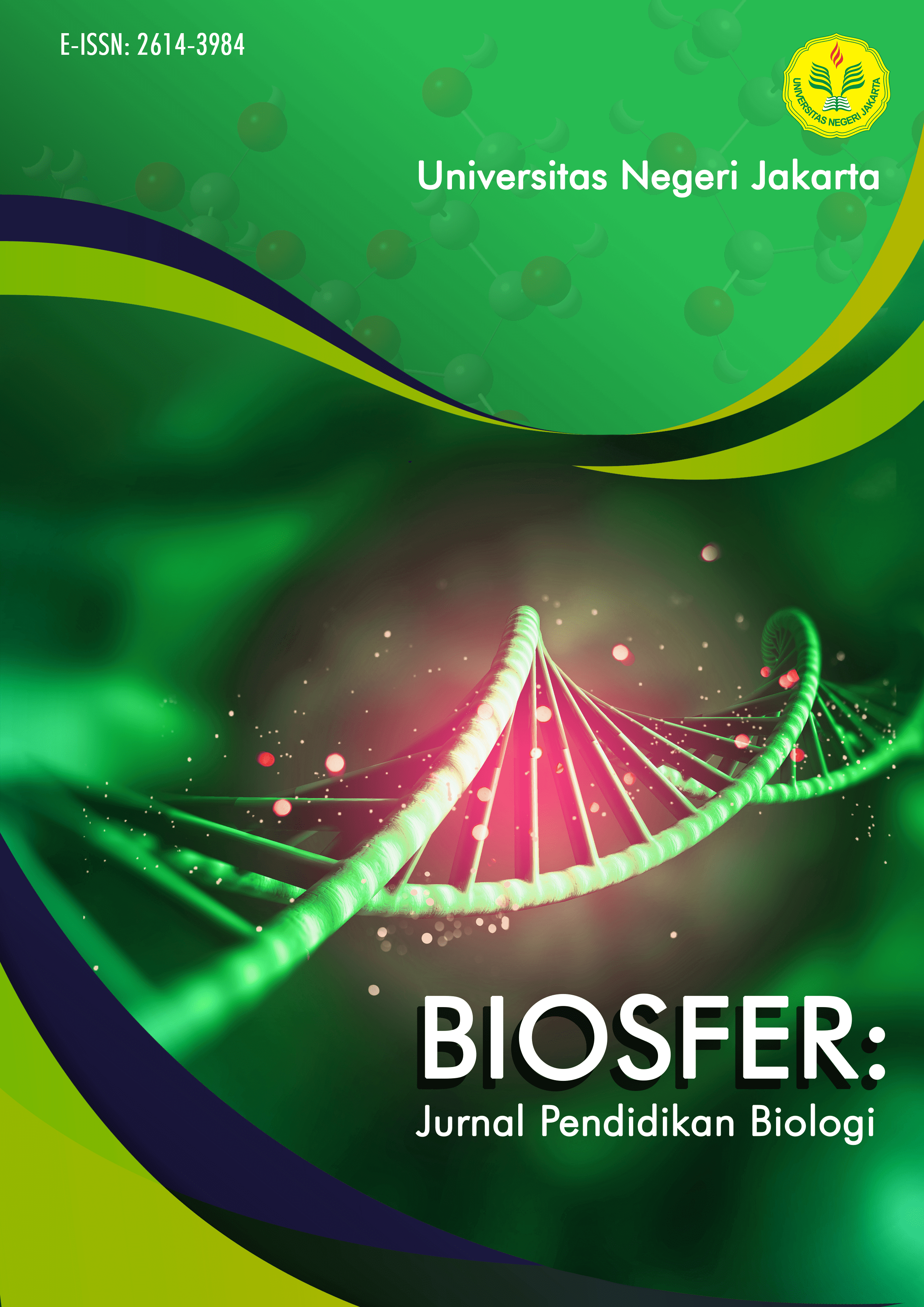Exploring the impact of intelligence quotient on mastery of biodiversity through e-modules
DOI:
https://doi.org/10.21009/biosferjpb.47819Keywords:
Biology, Intelligence quotient, Mastery of biodiversity , Material using e-modulesAbstract
E-modules can facilitate student understanding of complex biological concepts, including biodiversity, but their effectiveness also depends on individual student abilities. One significant factor influencing this success is the students' intelligence quotient, which affects how they process and comprehend complex information. This research aims to determine the relationship between intelligence quotient with mastery of biodiversity material using e-modules. The method used in this research is a quantitative descriptive method with correlation studies. The sample was taken from as many as 177 students from SMAN in Tangerang City was collected using multistage random sampling technique. To assess these skills, a test instrument in the form of multiple-choice questions is used. The prerequisite test shows that the data is normally distributed, the data is homogeneous, the data is linear, the data is free from symptoms of heteroscedasticity, the data is not multicollinearity, and the data is free from symptoms of autocorrelation. Through testing the hypothesis, the equation Ŷ = 41.268 + 0.580X1 is obtained. The correlation coefficient obtained was 0.881, which means there is a very strong relationship. . Based on this research, it can be concluded that there is a positive relationship between intelligence quotient, reading comprehension ability, and mastery of biodiversity material using e-modules.
References
Agustina, T., Restuati, M., & Asphani, F. (2017). Hubungan kecerdasan emosional dan kecerdasan intelektual terhadap hasil belajar biologi siswa pada materi sistem saraf di SMA Asy-Syafi’iyah Medan. Jurnal Pendidikan Matematika Dan Sains, 12(1), 39–43. https://doi.org/10.24114/jpms.v12i1.9002
Al-Muhdhar, M. H. I., Basaroh, A. S., Prasetyo, T. I., Sumberartha, I. W., Mardiyanti, L., & Fanani, Z. (2021). Improvement of creative thinking skills and environmental literacy through the e-module of surrounding nature exploration. AIP Conference Proceedings, 030003. https://doi.org/https://doi.org/10.1063/5.0043102
Anderson, L. W., & Krathwohl, D. R. (2010). Kerangka Landasan Untuk Pembelajaran, Pengajaran, dan Asesmen (Revisi Taksonomi Pendidikan Bloom). Pustaka Pelajar.
AR, N., & Syahrizal. (2016). Relation Between Intellectual Intelligence and Learning Achievement of the Students of Dayah Almadinatuddiniyah Syamsuddhuha, Cot Murong, North Aceh. Edukasi Islami: Jurnal Pendidikan Islam, 14(02), 207–222. https://doi.org/10.32729/edukasi.v14i2.18
Binet, A. (2019). The Mind and The Brain : Dahsyatnya Otak dan Pikiran Manusia. Desa Pustaka Indonesia.
Bungawati, Taiyeb, A. M., & Hartati. (2018). Pengaruh Kecerdasan Intelektual, Kecerdasan Emosional Dan Kecerdasan Spiritual Terhadap Hasil Belajar Biologi Siswa SMA Negeri di Kabupaten Soppeng. Journal of Biology Education, 1(3), 192–202. https://doi.org/10.35580/ujbe.v1i2.6419
Creswell, J. W. (2019). Research Design Pendekatan Kualitatif, Kuantitatif, dan Mixed (Edisi Keti). Pustaka Pelajar.
Delita, F., Berutu, N., & Nofrion. (2022). Online Learning: the Effects of Using E-Modules on Self-Efficacy, Motivation and Learning Outcomes. Turkish Online Journal of Distance Education, 23(4), 0–3. https://doi.org/10.17718/tojde.1182760
Etobro, A. B., & Fabinu, O. E. (2017). Students’ Perceptions Of Difficult Concepts In Biology In Senior Secondary Schools In Lagos State. Global Journal Of Education Research, 16, 139–147. http://dx.doi.org/10.4314/gjedr.v16i2.8
Gleason, N. W. (2018). The fourth industrial revolution and higher education. In Higher Education in the Era of the Fourth Industrial Revolution. Nature Singapore.
Isnain, Z., Jazuli, M., & Suharto, S. (2021). Catharsis : Journal of Arts Education The Impact of Intelligence Quotient On The Learning Outcomes of Musical Art in State Schools. Catharsis: Journal of Arts Education, 10(2), 130–141. https://doi.org/ 10.15294/ catharsis.v10i2.51535
Kahar, M. I., Cika, H., Nur Afni, & Nur Eka Wahyuningsih. (2021). Pendidikan Era Revolusi Industri 4.0 Menuju Era Society 5.0 Di Masa Pandemi Covid 19. Moderasi: Jurnal Studi Ilmu Pengetahuan Sosial, 2(1), 58–78. https://doi.org/10.24239/moderasi.vol2.iss1.40
Kathirisetty, N., Jadeja, R., Garg, D., & Thakkar, H. K. (2022). On the Design of Student Assessment Model Based on Intelligence Quotient Using Machine Learning. IEEE Access, 10, 48733–48746. https://doi.org/10.1109/ACCESS.2022.3171807
Kiong, T. T., Yunos, J., Mohammad, B., Othman, W., Heong, Y. M., & Mohamad, M. M. (2012). The Development and Implementation of Buzan Mind Mapping Module. Procedia - Social and Behavioral Sciences, 69(May 2014), 705–708. https://doi.org/10.1016/j.sbspro.2012.11.464
Kurnia, H. (2019). Pengaruh Kecerdasan Intelektual, Emosional Dan Spiritual Terhadap Prestasi Belajar Pendidikan Kewarganegaraan. Academy of Education Journal, 10(01), 1–21. https://doi.org/10.47200/aoej.v10i01.267
Kurniawati, K., & Zubir, Y. (2020). Kecerdasan intelektual dan prestasi belajar siswa kelas XI MIPA SMA Negeri 8 Yogyakarta. Jurnal Psikologi Terapan Dan Pendidikan, 2(2), 103. https://doi.org/10.26555/jptp.v2i2.21073
Lase, N. K., & Harefa, K. (2022). Development Of Biology E-Modules Using Proffesional PDF Flip Application On Human Respriratory System Materials. Scientia, 11(2), 750–755. http://infor.seaninstitute.org/index.php/pendidikan/article/view/1032
Li, G., Hou, Y., & Wu, A. (2017). Fourth Industrial Revolution: technological drivers, impacts and coping methods. Chinese Geographical Science, 27(4), 626–637. https://doi.org/10.1007/s11769-017-0890-x
Liu, F., Shi, Y., & Liu, Y. (2017). Intelligence quotient and intelligence grade of artificial intelligence. Annals of Data Science, 4, 179-191. https://doi.org/10.1007/s40745-017-0109-0
Nunung, R., & Kusyanti, T. (2021). International Journal of Active Learning Development of Interactive Digital Module Based on Virtual Laboratories in The Covid-19 Pandemic Era in Dynamic Fluid Materials. International Journal of Active Learning, 6(1), 41–48. https://www.learntechlib.org/p/219439/
Pratidhina, E. (2020). Education 4 . 0 : Pergeseran pendidikan sebagai konsekuensi revolusi industri 4 . 0. Humanika, Kajian Ilmiah Mata Kuliah Umum, 20(1), 1–12. https://doi.org/10.21831/hum.v20i1.29290.1-12
Rahma, K. A., Nugroho, A. S., & Mulyaningrum, E. R. (2023). E - Modul Keanekaragaman Hayati Sebagai Implementasi Hasil Penelitian Jenis Tumbuhan Obat dan Pemanfaatannya Desa Kayen. Titian Ilmu: Jurnal Ilmiah Multi Sciences, 15(1), 71–75. https://doi.org/10.30599/jti.v15i1.1750 E-Modul
Rosa, E. (2018). Pengaruh Persepsi Peserta Didik Atas Gaya Belajar Dan Kecerdasan Intelektual Terhadap Prestasi Belajar Bahasa Inggris. INFERENCE: Journal of English Language Teaching, 01(01), 1–98. https://core.ac.uk/download/pdf/236199354.pdf
Sanusi, A. (2018). Pendidikan untuk Kearifan : Mempertimbangkan Kembali Sistem Nilai, Belajar, dan Kecerdasan (Y. Iriantara (ed.)). Penerbit Nuansa.
Suyanto, A. (2015). The Effectiveness Of Mindmapping In Improving Students. IJEE (Indonesian Journal of English Education), 2(2), 101–119. https://doi.org/10.15408/ijee.v2i2.3089
Downloads
Published
How to Cite
Issue
Section
License
Copyright (c) 2024 Biosfer: Jurnal Pendidikan Biologi

This work is licensed under a Creative Commons Attribution 4.0 International License.
The Authors submitting a manuscript do so on the understanding that if accepted for publication, copyright of the article shall be assigned to Biosfer: Jurnal Pendidikan Biologi (Biosferjpb) and Departement of Biology Education, Universitas Negeri Jakarta as publisher of the journal.



